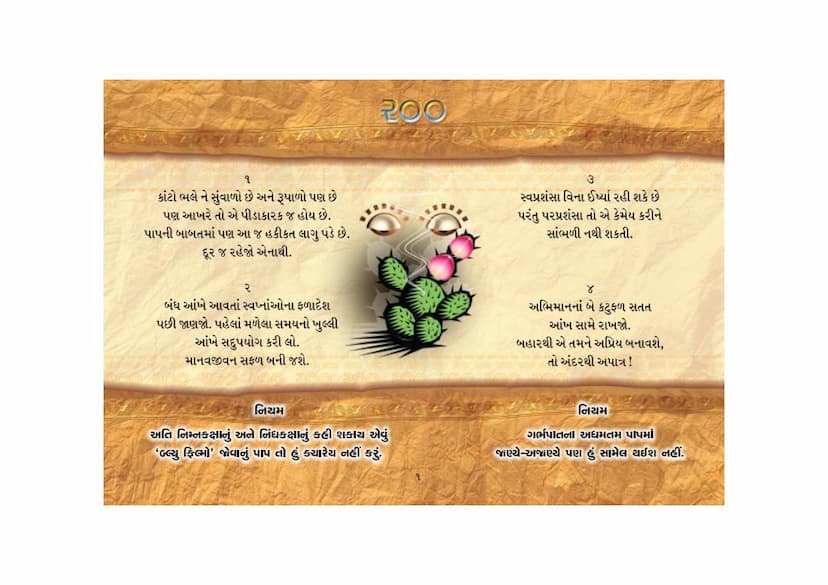200
Added to library: September 1, 2025

Summary
Here's a comprehensive summary of the Jain text "200" by Ratnasundarsuri, based on the provided pages:
This book, "200" by Ratnasundarsuri, appears to be a collection of aphorisms, reflections, and personal vows or commitments, presented in a concise and often poetic style. The core theme revolves around living a virtuous, ethical, and spiritually inclined life in accordance with Jain principles, while navigating the complexities and temptations of the modern world.
The author emphasizes the importance of:
-
Discipline and Self-Control (Niyams): A significant portion of the text is dedicated to specific vows and commitments the author makes for themselves. These cover a wide range of behaviors, including:
- Avoiding harmful actions: Refraining from watching "blue films," participating in abortion (even indirectly), engaging in vulgarity at weddings, hiring goons for debt collection, spreading gossip, promoting negativity, using abusive language, promoting or engaging in violence, creating harmful literature, and engaging in any activity that harms living beings, knowledge, or the environment (like firecrackers).
- Promoting positive actions: Giving sweets to employees' children, respecting parents, offering support to the needy, sharing knowledge, practicing forgiveness, and praying for the well-being of all beings.
- Maintaining purity and integrity: Avoiding vulgar dress, not visiting places with vulgar content, not carrying religious texts into unclean areas, and maintaining ethical financial practices.
-
Ethical Conduct and Moral Values: The text consistently promotes ethical behavior and the upholding of moral values, often contrasting them with societal norms or modern trends. Key themes include:
- Truthfulness and Honesty: Speaking the truth, and not defending one's own mistakes.
- Humility and Avoidance of Ego: Discouraging self-praise and pride, recognizing the pitfalls of arrogance.
- Compassion and Forgiveness: Extending forgiveness to others and being mindful of not causing hurt.
- Integrity in Relationships: Emphasizing true friendship, not taking advantage of others, and prioritizing character over material gain in marriage.
- Responsibility towards Family: Highlighting the importance of respecting and caring for parents, and being present for them.
-
Spiritual Growth and Inner Transformation: The book encourages introspection and a focus on spiritual development over material pursuits.
- Detachment from Materialism: Warning against the excessive pursuit of wealth and possessions, and recognizing that true happiness doesn't come from them.
- Mindfulness and Awareness: Encouraging awareness of one's thoughts, actions, and their consequences, both in this life and in future lives.
- The Importance of the Soul: Contrasting the journey of science (from mountain to atom) with the journey of religion (from soul to God), and advocating for the latter.
- Living a Meaningful Life: Emphasizing that life should be about finding purpose and understanding, not just accumulation or pleasure.
-
Critique of Modern Trends and Blind Faith: The author offers a critical perspective on certain aspects of modern life.
- Skepticism towards Unchecked Science: Cautioning against becoming a blind devotee of science that doesn't offer rest.
- Critique of Superficiality: Pointing out the disconnect between intellectual knowledge and practical application, and the superficiality of modern values.
- Awareness of Temptations: Warning against the allure of worldly pleasures and the need for constant vigilance.
Key Recurring Ideas and Metaphors:
- Thorns and Pain: Comparing the attractiveness of sin to a soft, beautiful thorn, which ultimately causes pain.
- Eyes Open vs. Eyes Closed: Advising to make the most of the present with open eyes rather than relying on dreams or wishful thinking.
- Balance and Harmony: The analogy of the tabla's beat needing to match the flute's melody is used to suggest that the mind's voice should align with the soul's nature.
- The Nature of Happiness and Suffering: Emphasizing that true happiness comes from contentment, not from the acquisition of more. Suffering is often seen as a consequence of past actions or present desires.
- The Power of Words: Highlighting the destructive impact of negative speech and the importance of speaking well or staying silent.
- The Body as an Honest Witness: The body's consequences are unavoidable, unlike the mind which can be deceptive.
In essence, "200" by Ratnasundarsuri serves as a guide for spiritual aspirants, offering practical advice, ethical guidelines, and personal commitments to foster a life of righteousness, inner peace, and ultimate liberation. It encourages a conscious effort to cultivate positive qualities and actively shun negative ones, all within the framework of Jain philosophy.